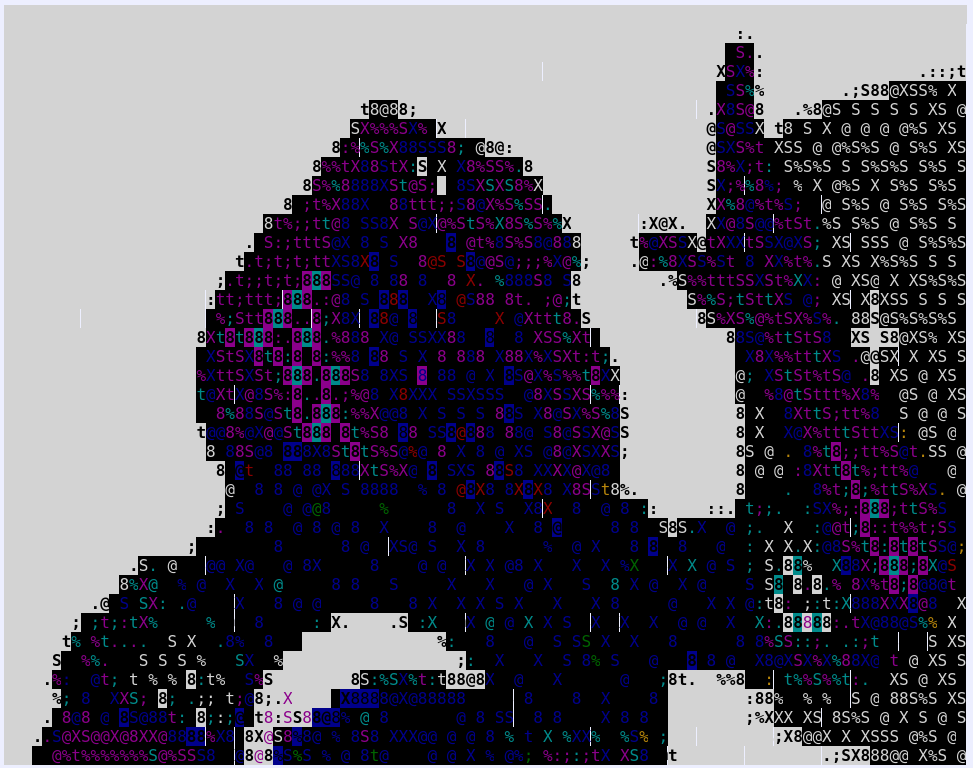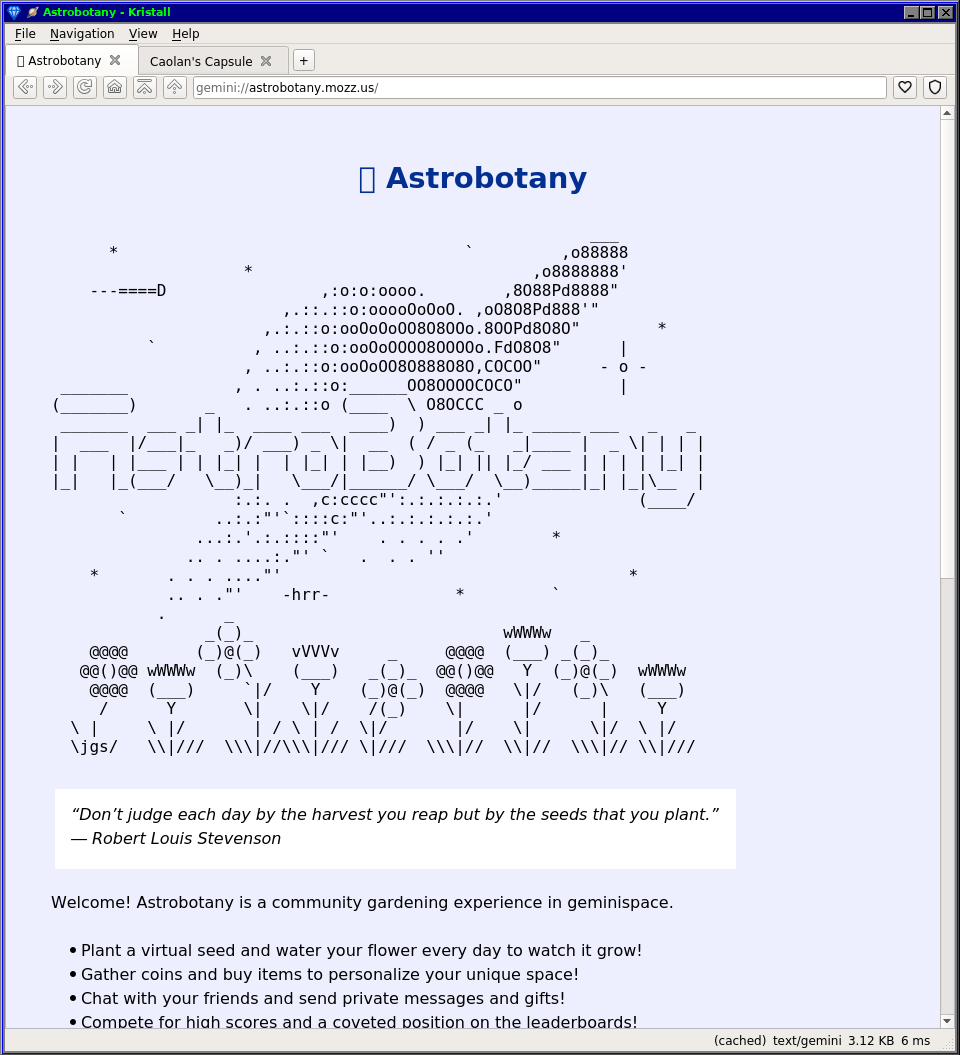The Net Outside the Web
Anyone who was around to experience Web 1.0 remember what it was like when the web wasn't centralised to a handful of corporate sites. The web in the late 90s and early 2000s was one that was fun to explore, it felt like a vast space, and anyone you met along the way felt genuine. Search Engines, when they worked, gave you what you were searching for, and when they didn't, there were web directories and web rings to explore. You didn't feel like you were being watched or used to make money.
Then the likes of Facebook and Twitter happened.Over time, it felt like the web started to be another market for rich people to make even more money. Ads everywhere, cookies tracking you everywhere, and the data it collects goes back to a social media to sell to advertiser to personalise to you. Thanks to GDPR (Which was a noble attempt to fix the issue), you get bombarded with messages asking to accept cookies, lying about respecting your privacy and making it as difficult as possible to reject.
It's safe to say the web isn't what it once was, and I always accepted that I can never experience the days of old again. If only there was a space like the web, but not the web.
Turns out, there are.The internet and the web are not one and the same. The web is simply one protocol of the internet. You see the "https://" at the beginning of the url bar? That's the Hypertext Transfer Protocol, or as it's more commonly known, The World Wide Web.
The World Wide Web wasn't the first protocol and still isn't the only way to communicate online. Web 2.0 has caused the other protocols to make a comeback and have thriving communities. Telnet, Gopher, Finger, and even new ones based off those have been created, like Gemini and Spartan.
These protocols aren't as advanced or capable as HTTP, but in this case, that's a good thing. Little risk of centralisation, or web tracking, or ads.
When the internet first became a thing, people were just emailing each-other, sharing files through FTP, and using Finger to updater and check statuses.
Finger is a simple protocol, you type in the address in a CLI, and then you get a short paragraph or two describe what the person you "fingered" has been up to or anything they have planned. It was simple enough.
By the 1980s, people were able to go online with their 8-bit microcomputers using the phone line. They connected to DDial rooms, Bullitein Board Systems (BBS), and Multi-User Dungeons (MUD). Back then, people connected to those directly through the phone line, but nowadays they connect to them using an internet protocol known as telnet (some support SSH, but that's basically the same thing but more secure).
DDials are the equivalent or IRC, Matrix or Discord where you're in a chatroom with other people. BBSes are like Forums, though nowadays they have MRCs, which work the same as DDials and IRC. MUDs are text-based MMO RPGs.
BBS is probably the most known out of all these spaces. They're known for their colourful ANSI art, exploration and "doors" (basically games).
When the WWW came around in the early 1990s, it had 2 competitors, Wide Area Information Service (WAIS), and Gopher. WAIS was a glorified FTP, and gopher wasn't as flexible. The web won out, WAIS is completely dead, but Gopher managed to survive all this time, and has been seeing an increase of travellers in recent years.
Fast forward to 2018, decades after the web has basically dominated the net, and out came a new protocol that changed everything for me: Gemini
Gemini is a protocol inspired by Gopher, which claims to not be replacing that or the web, and instead provide a space for those who don't enjoy the web.
The space that consists of Finger, Gopher and Gemini is known as the "SmolNet", which is what I will refer to them as from here on.
The SmolNet is mostly text-only, but you can add inline images and other peices of media, depending on if the browser you use supports them.
Most Gemini capsules prefer to use ANSI art, like this.

So this is what a Gemini capsule typically looks like.

Not much to them compared to a modern website, but it definitely resembles the old web in a weird way and there's opportunity for people to express themselves with these.
I discovered the Smolnet at the height of the Covid pandemic in 2020. I fell in love with it as soon as figured out what it was and how to navigate it.
Search engines on the Smolnet don't work very well, so you have to rely on web rings (or Orbits and Gopher rings, respectively) and link directories. The fact that there's no centralised space to be tempted to go back to, you're just left to explore.
I found myself exploring the SmolNet on my iPad in my end, and on my PC on my breaks.
There are "social medias" on the SmolNet, there are imageboards, status pages, places you can share short stories, and there is even a a real time chat on Gemini, but I don't know of any browsers that support it.
There are also mirrors of bigger sites on the web, such as loads of News sites, Reddit and Wikipedia. I enjoy browsing Reddit on Gemini, as they don't endlessly scroll 9Gemini simply doesn't have the technology for it), and only gives you the top 20 posts an hour, which really helps avoid addiction.
I found that it made me use social media less, which I was heavily addicted to when I first got into it, and eventually led me to quit it altogether, and I've been mentally better for it.
There is also the BBS scene, which is still around today, and many connect to a real time chat called the Multi-Relay Chat, or MRC, which has events every weekend! I have a good time chatting with everyone on that.
Exploring these new protocols has been an amazing experience for me. They feel like a secret club, and the people are way nicer than on the web.
So how do you explore the SmolNet? Well like the web, you need a browser for them. Most browsers support all of the protocols grouped into the SmolNet. For Desktop, I'd personally recommend Kristall, but many prefer Lagrange. For iOS, I'd recommend Elaho, and Lagrange for Android. For BBS, I use Syncterm.
I can't recommend it enough. These spaces have improved my mental health significantly, and I feel like I finally have a community outside of the Yesterweb I can go to to share thoughts and news about my life!
This article was created by Cobra!